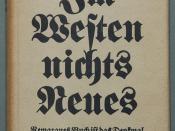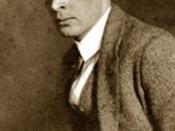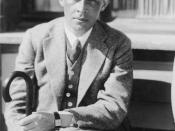All Quiet On the Western Front The perpetual presence of eradication, violence, death, and fear during war numbs the senses, desensitizes the soul, and kills the conscience. World War I defined a whole generation, and it corrupted them. In the novel, All Quiet on the Western Front, by Erich Maria Remarque, the author conveys his anti-war views. Remarque continually shows that the war created a "lost"ÃÂ generation devoid of morality and hope.
The thematic idea of being "lost"àcan be traced throughout the novel. For instance, when Paul returns home during his leave, he finds that he does not belong there any more. His family and neighbors can not begin to comprehend the horrors he has been forced to endure, and their "worries, aims [and] desires"æ[he] cannot comprehend"à(168). Even his room, the one place he could go back to, can only provide him with memories and shadows (172).
The realization that he can never go back to how he was before the war becomes certain in Paul's mind. With all his strength, Paul tries to conquer the "terrible feeling of foreigness"ÃÂ (172) that envelops him, but finds himself powerless against it. He then clings as a lost child to the one thing he recognizes and understands-"I am a soldier"ÃÂ (173). With the turning of the pages of his once beloved books, the slight hope he held onto of forgetting the war once he returned home dies within him.
Additionally, Paul remarks that the war obliterated the virtues of the men of the Second Company. The morality Paul and his comrades once possessed has "vanished in bombardment, in despair, in brothels"ÃÂ (295). For example, when Gerard Duval falls into where Paul hides, he becomes one of the "wild beasts"ÃÂ (113) the war has made. Paul kills only so that...



All Quiet on the western Front
Some fair ideas...
0 out of 0 people found this comment useful.